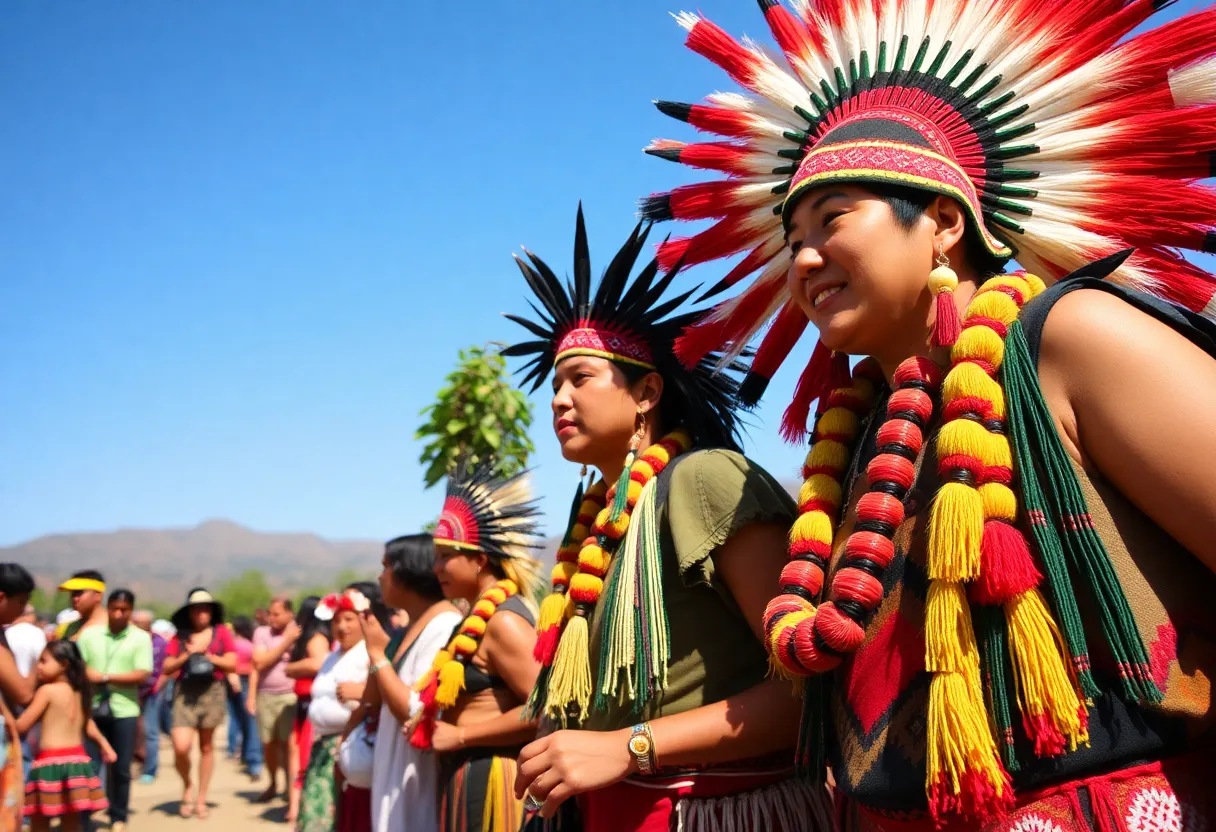

Vibrant community gathering celebrating Indigenous culture and heritage.
On December 28, 2024, Sumter, South Carolina, witnessed a significant cultural event aimed at highlighting the rich history and ongoing struggles of Native American tribes, particularly those within South Carolina. Notable figures, including Chief Louis C. Chavis of the Beaver Creek Indians and Vice Chief Tammy Ray Stevens of the Sumter Tribe of Cheraw Indians, engaged with an audience at Central Carolina Technical College, demonstrating traditional dance and discussing critical issues faced by Indigenous peoples.
The day began with dense fog and a high temperature of 66°F, gradually shifting to occasional showers in the afternoon. The chance of rain stood at 40%, with conditions expected to become cloudy by nightfall. The forecast indicated a low of 61°F overnight, with light southeast winds at 5 to 10 mph.
The courtyard of Central Carolina Technical College served as the backdrop for a vibrant display of Indigenous culture. Chief Chavis and Tammy Stevens, adorned in traditional attire, showcased the Crow Hop Dance, an integral part of the Sumter Cheraw Indian traditions. Their performance not only highlighted their cultural heritage but also aimed to educate attendees about the historical significance of their dance and the symbols represented in their clothing.
Speaking to an attentive crowd, Chief Chavis addressed the ongoing challenges faced by Native American tribes. He emphasized the importance of federal recognition for tribes, stating, “Federal recognition opens doors to resources and rights similar to those of U.S. states.” He pointed out that while South Carolina recognizes nine tribes, only one, the Catawba Nation, holds federal recognition. This distinction is crucial, as it allows access to necessary funding and the ability to establish self-governance.
Stevens noted the continual struggle for Indigenous identity, explaining that “Native American people are the only ones who have to consistently prove who we are.” She lamented the barriers imposed by a history of regulatory and societal challenges, which complicate the process of obtaining necessary documentation for tribal recognition. This highlights a broader issue within the community: the fight against stereotypes and misunderstandings about Native American existence and culture.
The event also emphasized the importance of education in erasing false stereotypes and fostering allyship. Chief Chavis urged attendees to engage with Indigenous cultures authentically, delving into the realities of their traditions rather than relying on outdated narratives. “I know my people aren’t savages,” he declared, asserting the dignity and resilience of Native tribes.
The history of Native Americans in South Carolina spans thousands of years, with tribes such as the Catawba and Cheraw shaping the region long before European contact in the 1500s. However, the narrative of Indigenous people has often been marred by displacement, disease, and cultural erasure. Efforts are now being made to revive and preserve these rich histories through events like this.
The gathering was more than a celebration of culture; it served as a rallying cry for recognition and respect toward Indigenous communities. As they performed and shared their stories, Chavis and Stevens reminded everyone present of the crucial role they play in fostering understanding and support for Native rights. The event concluded with an open invitation for the community to participate in the ongoing dialogue surrounding Native rights and cultural preservation.
Sumter residents left with a renewed sense of appreciation for the Indigenous heritage and the challenges that continue to affect these communities today. The hope remains that through education and awareness, a more just future for Native Americans can be achieved in South Carolina and beyond.
News Summary The South Carolina Senate has voted 33-8 to remove Treasurer Curtis Loftis from…
News Summary South Carolina is facing a severe wildfire crisis, prompting Governor Henry McMaster to…
News Summary A tragic accident on Interstate 95 in South Carolina led to the deaths…
News Summary Students from Laurens County have recently showcased their academic talents, with many making…
News Summary Rob Rain has announced his resignation from the Spartanburg City Council to join…
News Summary Nayef Samhat will step down as Wofford College president at the end of…